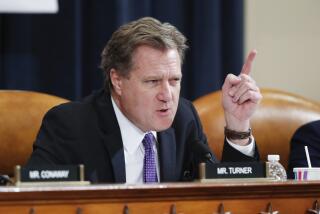Key Lawmaker Not Sold on Intelligence Czar
WASHINGTON — A key congressional Republican signaled his opposition Wednesday to one of the central recommendations to reform the intelligence community, saying he would not be “steamrollered” into creating a post of national intelligence director.
Rep. Duncan Hunter (R-El Cajon), chairman of the House Armed Services Committee, said he feared that putting one official in charge of all 15 U.S. intelligence agencies, as proposed by the commission that investigated the Sept. 11 attacks, could hamper the ability of the Pentagon to wage war.
“A great deal of intelligence assets are under the control of the Department of Defense,” Hunter said, “and they have, on a momentary basis, lives on the line.”
Hunter said that in war zones such as Afghanistan and Iraq, commanders relied on real-time intelligence to make battle decisions.
“It makes sense that you shouldn’t have that intelligence stopped or impeded by some guy back in Washington, D.C., who says, ‘I want to use that platform for something else,’ ” Hunter said. “We are not going to be steamrollered in the Armed Services Committee.”
Hunter’s comments were the first opposition from a chairman of a congressional oversight committee to the sweeping reform recommendations made by the Sept. 11 commission in its final report last month. The Senate and House armed services committees would have jurisdiction over major portions of reform legislation.
Commission members had predicted there would be resistance from the Defense Department and the committees that oversee it, because the military stands to lose control over billions of dollars in intelligence spending, as well as control over satellites and other espionage equipment and resources.
Under the existing structure, the Pentagon controls more than 85% of the budget for the U.S. intelligence community, and many of the 15 agencies are within the Defense Department. The Sept. 11 panel has argued that information-sharing problems that plagued the nation’s spy services can only be solved by empowering a new director with authority over all intelligence spending and the hiring and firing of senior personnel.
Defense Secretary Donald H. Rumsfeld signaled his opposition to the creation of a national intelligence director in testimony before the Sept. 11 commission this year, saying consolidating control under an intelligence czar could do the nation a “great disservice.”
Rumsfeld appeared alongside Bush when the president announced his reform proposal Monday. The White House did not call for shifting budgetary authority away from the Pentagon. Doing otherwise “would have started a war inside the administration,” said a senior GOP aide in Congress.
Sen. John W. Warner (R-Va.), chairman of the Senate Armed Services Committee, has voiced support for the White House reform plan, issuing a statement Monday that praised Bush for “proposing wise changes in the intelligence community.”
But many lawmakers expect Warner’s committee to strike a far more skeptical tone when it begins hearings Aug. 16 to consider the commission’s reform ideas. Other congressional panels have been largely supportive of the sweeping recommended changes.
A spokesman for Warner declined to comment on whether Rumsfeld had been asked to testify, but said the hearings would focus on whether the Pentagon should be stripped of budgetary authority over intelligence agencies, as well as the potential effect on armed services.
“Sen. Warner is interested in doing what is right for the war fighters as well as the professionals in our intelligence community,” said Warner spokesman John Ullyot.
Hunter said his committee would hold hearings Tuesday and Wednesday and expected to hear testimony from the heads of the military intelligence agencies, as well as from Deputy Defense Secretary Paul D. Wolfowitz and the chairman and vice chairman of the Sept. 11 panel.
The House Intelligence Committee held its first hearing on the commission’s recommendations Wednesday. Senior officials from the CIA, the FBI and State Department generally endorsed the idea of creating an intelligence director, but warned that the effort would fail if the job holder did not have broad new powers.
More to Read
Get the L.A. Times Politics newsletter
Deeply reported insights into legislation, politics and policy from Sacramento, Washington and beyond. In your inbox three times per week.
You may occasionally receive promotional content from the Los Angeles Times.










